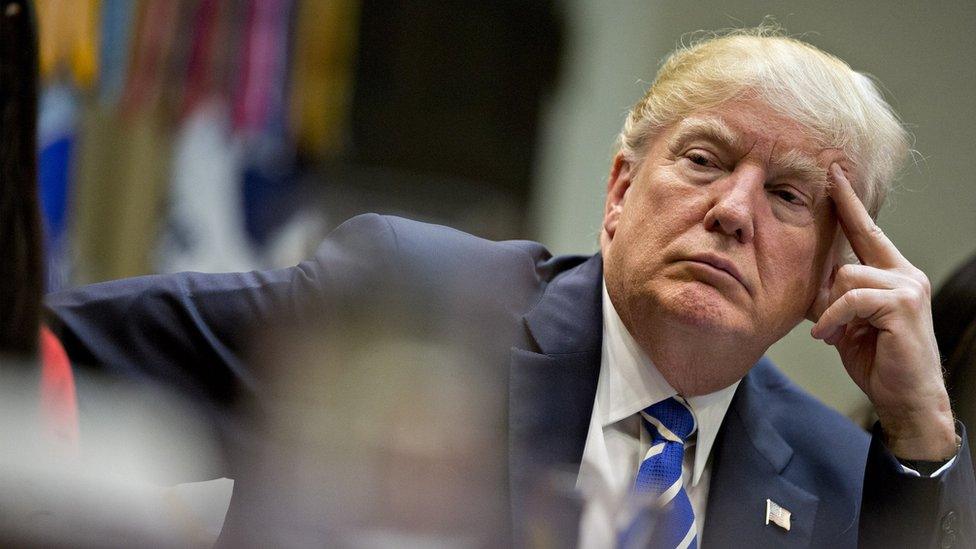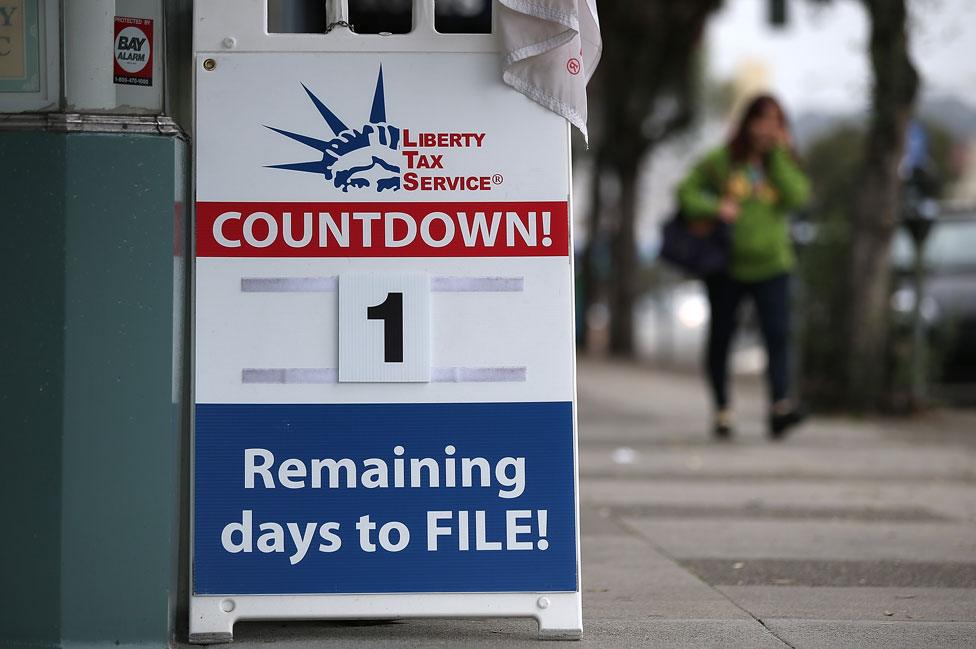What will Trump's tax plan actually do?
- Published

The Trump Organization is a limited liability corporation, one of the types of businesses that would benefit from his expected tax proposal
During the election campaign, Donald Trump called for a simpler tax code and lower tax rates on business and families. The administration provided an update on Wednesday.
What's the headline?
Lower business taxes.
During the campaign, Trump pledged to slash taxes on companies.
Right now, the US corporate tax rate is 35%, among the world's highest (many firms pay far less). He wants to reduce that to 15%. Another type of business - known as a pass-through entity because profits "pass through" to the owners and get taxed as personal income - would get that same rate. (Real estate firms - including President Trump's - are often organised this way.)
That corporate rate would be lower than Britain's (about 20%) and Hong Kong's (16.5%), but not as low as Ireland's (12.5%), according to a ranking, external by the KPMG accounting firm. China's corporate tax rate is 20%, but some firms and industries there face a 15% rate.
Why would Trump do that?
The president says it will spur economic growth by encouraging spending and investment. It's also supposed to make the US more competitive, encouraging businesses not to store cash overseas.
In general, the idea of lowering the corporate tax rate and simplifying the lengthy, bureaucratic US tax code has support among economists and politicians of many stripes. But the devil's in the detail.
How would Trump pay for it?
It's not clear. The administration says the cuts will be paid for by closing tax loopholes available to "special interests" and the very rich, but those haven't been specified. He's also proposed an amnesty period when corporations holding cash overseas can repatriate the money at a discounted rate.
But the main way they say it will be paid for is through increased economic growth - this spurs tax revenue.
Treasury Secretary Steve Mnuchin, a former investment banker, has said the tax changes will act as a stimulus that will lead to economic growth of 3% - much higher than most economic projections.
The "pay for itself" argument in favour of tax cuts has a long and contested history in the US, with many doubting that the evidence bears out the theory.

So what's the downside?
Lower tax rates mean less tax revenue - which could be a serious problem for Republicans in Congress worried about national debt and a ballooning deficit.
Estimates for the loss vary.
Under the plan Mr Trump outlined during the campaign, the Tax Policy Center, a nonpartisan outfit, estimated that collections would fall $6.2tn over a decade, with about three quarters of that related to business taxes.
The organisation also said it would add $7.2tn to the debt in that time, including higher interest payments.
The Tax Foundation said Mr Trump's campaign plan would lead to at least a $4.4tn drop in revenue over a decade, but a large chunk could be made back with new revenue.
What's more, while businesses back lower taxes in theory, they're loathe to relinquish their tax benefits.
For example, oil giant ExxonMobil has said, external it generally supports "comprehensive review", but opposes increases on the oil and gas industry, which currently benefit from some types of business deductions.
What else is in the plan?
The plan outlined Wednesday also includes benefits for ordinary households that Mr Trump promised on the campaign trail. That includes a major increase in the amount of money families can subtract from their tax bill, which would lower their taxable income. The plan would also create just three tax brackets, with a top rate of 35%, down from 39.5%.
He also wants to repeal the tax on inheritances, a long-time Republican target that opponents dub the "death tax". (Generally speaking, Britain taxes non-property inheritances above £325,000 at 40%. The US also has a 40% rate, but only taxes inheritances worth more than $5.5m.)
Many of the details are still being worked on.
When will we know the details?
Much of what's been shared so far resembles campaign promises, but Mr Trump, who's facing the 100-day mark, wanted to provide an update.
The president signed an order last week that requires Treasury Secretary Steve Mnuchin to report on ways to simplify the tax within 60 days, with a final report due in 150 days.
Many things will have to be hashed out with Congress. Mr Mnuchin said in February he hoped to pass comprehensive tax reform before Congress takes a break from Washington in August, but he has since backed off that goal.
What does Congress think?
Republicans have their own plan, which differs from Mr Trump's. (Among other things, it offers a less dramatic tax reduction and proposes a new tax to help pay for it.)
Some that Mr Trump's ideas are feasible. In a statement, external Wednesday, top Republicans called Mr Trump's principles "critical guideposts" for an overhaul.
Meanwhile, Democrats are under pressure from their base to oppose Mr Trump.
On Wednesday, before the briefing, Senator Chuck Schumer tweeted, external: "We'll look at it, but if gives a huge tax break to the very wealthy that won't pass muster w/ Democrats."
After the announcement, another key Democrat, Senator Ron Wyden, dubbed the proposal, external an "elite giveaway."